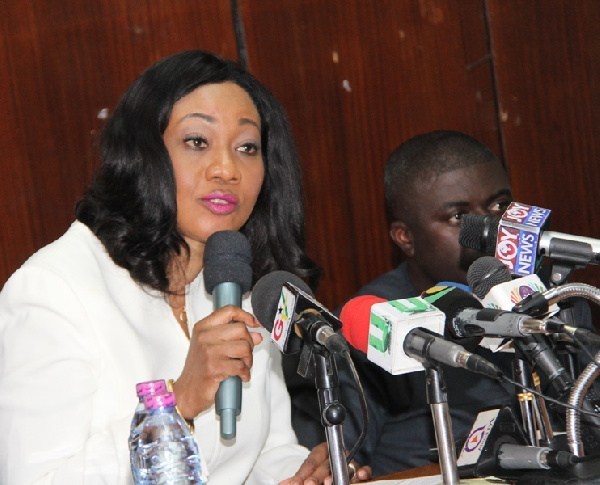Nobody can impose IPAC on EC – Jean Mensa
Chairperson of the Electoral Commission, Mrs Jean Mensa says while the Commission will continue to seek consensus building in carrying out its mandate, it will resist any attempt to impose any body or individual on it.
Responding specifically to whether the role of the Inter-Party Advisory Committee interferes with the workings of the Commission, Mrs Jean Mensa said while it does not see IPAC as interference, it must remain an advisory body and not one to impose its will on the Commission.
The EC Chairperson who was speaking in an interview with Graphic Online while she led officials of the Commission to visit the Graphic Communications Group Limited in Accra on Wednesday, said the independence of the Commission is not in doubt, emphasizing that the 4th Republican Constitution that enshrines its autonomy is specific that the Commission cannot be bound by the advice of anybody.
The opposition National Democratic Congress (NDC) in particular, a member of the IPAC which groups political parties and other key election stakeholders into a consultative and advisory body, has in recent times challenged a number of decisions by the EC and demanded corrective measures.
But Mrs Jean Mensa says while dialogue, consensus building and research remain key in the Commission’s approach to executing its mandate, nothing erodes its independence if consensus building fails.
“I think it’s an advisory body as you rightly said and a forum for the exchange of ideas and hopefully you’ll build consensus. I think it was a body that was set up to enable the EC inform the political parties of its decisions. Naturally when you are going through a registration process you are required to inform the parties 21 days ahead of the exercise and spell out the modalities. It’s always better to do this face-to-face rather than putting it in writing or putting up a public notice. So we do not find IPAC to be interfering but we find that there are certain elements in the society who are trying to impose IPAC on the Commission and trying to really reduce or water down the independence of the EC.
“The Commission takes its roots and its mandate from the Constitution, and nowhere in the law does it say that the EC should be bound by the advice of any other body, indeed it says that the EC cannot be bound by the advice of anybody, and the fact that we are stakeholders doesn’t mean that (we should) turn the law and tilt it and misinform the public… Yes it’s great to build consensus but if you cannot build consensus amongst everybody it doesn’t affect the work of the EC. The EC is an independent body. It doesn’t derive its powers from any individual, and I think it is important that we state this and therefore people can’t cast insinuations and put out falsehoods to try to impose their will on the Commission, it won’t work”, she said.
Mrs Jean Mensa said while disagreements may not be ruled out entirely from the Commission’s work, the electoral body will continue to dialogue, research and consult ahead of taking decisions.
“A typical one is what we discussed with the mode of registration for the district level elections. Naturally everybody would want to have a polling station at their doorstep and it is the ideal situation, but here we are, you have a proposal before you of 56 million dollars, and you are being asked to sign it so that we can refurbish obsolete kits and procure a few new ones. And you bring in a biometric consultant, mind you this consultant is the consultant that advised the EC in 2011, when the decision was taken to go biometric, so he designed the architecture and everything. The EC brings him in and says this is the proposal before us, we are being forced to sign it we are saying we want to know more. So he does his analysis and he says no, from 2011 to date technology has evolved. Who gets a brand new Samsung of 2019 and says I like the 2011 one and it’s more expensive? And if you have to refurbish too, very expensive to refurbish and even to procure. It doesn’t add up. So we were of the view that no, nothing binds us and especially when you do not have a contract, these are proposals that are before you and you can decide to take it or leave it.
“What we intend to do is to ensure value for money. Our elections…have been said to be the highest (cost wise). It’s not a label that you like, I mean what is it that makes it expensive, it is some of these unnecessary costs that are going to people’s pockets, and we must promote efficiency whilst reducing cost and promoting value for money. There is no need to put unearned money in the pockets of individuals while the taxpayer suffers.”



